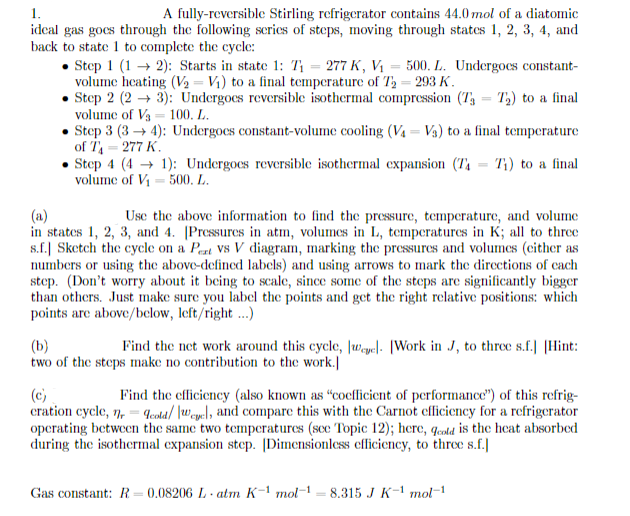Answered step by step
Verified Expert Solution
Question
1 Approved Answer
1. A fully-reversible Stirling refrigerator contains 44.0 mol of a diatomic ideal gas goes through the following series of steps, moving through states 1,

1. A fully-reversible Stirling refrigerator contains 44.0 mol of a diatomic ideal gas goes through the following series of steps, moving through states 1, 2, 3, 4, and back to state 1 to complete the cycle: (a) Step 1 (12): Starts in state 1: T = 277 K, V = 500. L. Undergoes constant- volume heating (V2 - V) to a final temperature of T2 - 293 K. = Step 2 (23): Undergoes reversible isothermal compression (T T) to a final volume of V3 100. L. Step 3 (34): Undergoes constant-volume cooling (V4 - Va) to a final temperature of T-277 K. Step 4 (4 volume of V 1): Undergoes reversible isothermal expansion (T = T) to a final 500. L. Use the above information to find the pressure, temperature, and volume in states 1, 2, 3, and 4. [Pressures in atm, volumes in L, temperatures in K; all to three s.f. Sketch the cycle on a Pet vs V diagram, marking the pressures and volumes (either as numbers or using the above-defined labels) and using arrows to mark the directions of each step. (Don't worry about it being to scale, since some of the steps are significantly bigger than others. Just make sure you label the points and get the right relative positions: which points are above/below, left/right ...) (b) Find the net work around this cycle, wel. [Work in J, to three s.f.] [Hint: two of the steps make no contribution to the work.] (c) Find the efficiency (also known as "coefficient of performance") of this refrig- cration cycle, cold/Wegel, and compare this with the Carnot efficiency for a refrigerator operating between the same two temperatures (see Topic 12); here, qcold is the heat absorbed during the isothermal expansion step. [Dimensionless efficiency, to three s.f.] Gas constant: R 0.08206 L atm K-1 mol-1-8.315 J K-1 mol-1
Step by Step Solution
There are 3 Steps involved in it
Step: 1
Solutions Step 1 Explanation To solve this problem we will use the ideal gas law and the definitions of the Stirling refrigerator cycle steps Step 1 1...
Get Instant Access to Expert-Tailored Solutions
See step-by-step solutions with expert insights and AI powered tools for academic success
Step: 2

Step: 3

Ace Your Homework with AI
Get the answers you need in no time with our AI-driven, step-by-step assistance
Get Started


